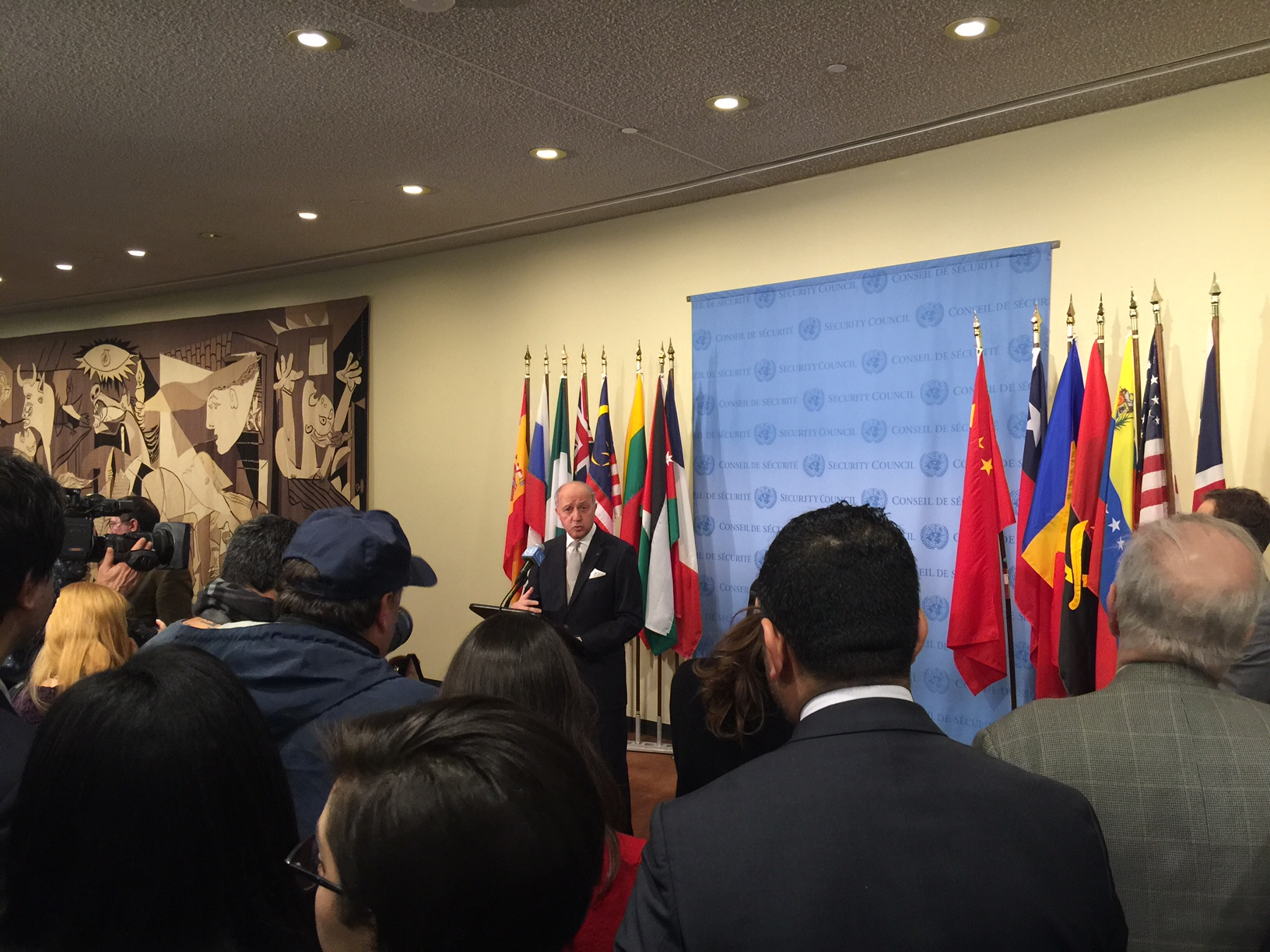LOC01:13
22:13 GMT
 Foreign Minister Laurent Fabius
Foreign Minister Laurent Fabius
NEW YORK, March 27 (KUNA) -- UN Secretary General Ban Ki-moon announced today that the UN is developing a Plan of Action on Preventing Violent Extremism, to be launched in September.
During his participation at a Security Council's open debate on "Victims of attacks and abuses on Ethnic or Religious grounds in the Middle East," Ban stressed that the atrocity crimes in the region demand an urgent response.
"We must end impunity for those committing serious crimes against any and all humanities," he voiced.
Ban also stressed that abuses in counter-terrorism are morally wrong and strategically counterproductive. The commission of atrocities, he added, never absolves governments of their responsibility to honor human rights obligations.
There is strong evidence that members of a number of different minorities have been victims of crimes against humanity, war crimes, and other very serious violations and abuses of human rights, ban said.
"This is especially true for women and girls," he confirmed.
Furthermore, Ban said that in Iraq, the Office of the UN High Commissioner for Human Rights (OHCHR) mission of investigation cited information strongly suggesting that ISIL may have perpetrated genocide, crimes against humanity and war crimes.
UN High Commissioner for Human Rights Zeid Al-Hussein confirmed, over a videocall to UNSC members, that two weeks ago an investigative mission by his office found that vicious attacks against the Yezidis by ISIL may have amounted to genocide.
He described them to be a "totalitarian-minded takfiri group determined to silence all dissent, and has been birthed as the chaos and violence of Syria bleeds across international boarders."
Al-Hussein affirmed that the international community's attention on the human rights of minorities is too often both "partial and sporadic."
He said there were "many states in the Middle East and other regions - via their actions - fertilize the soil of intolerance, where extremism takes root." He did not elaborate.
Without supreme and joint resolution now, Al-Hussein noted that the common bond will soon also disappear, along with the cultures stitched by time into one heritage.
On his part, the Parliamentary Under Secretary of State for the Foreign and Commonwealth Office Tobias Ellwood, of Britain, said that the key to ending suffering of ethnic and religious groups in the Middle East is leadership.
Bold leadership, he stressed, that promotes tolerance and brings people together regardless of ethnicity, religion, gender or sexual orientation.
In his address before the Security Council, Ellwood said that before ISIL began their war against Iraq and Syria, Assyrians and Yezidis had lived for millennia alongside Muslim majority.
Ellwood called for peace in Syria, and accused the "Assad's regime" to be ultimately responsible for the deaths of hundreds of thousands of civilians.
Therefore, the British official said that the Syrian people deserve a more accountable, inclusive, representative form of governance than Assad could ever offer.
He then advised the Council to counter ISIL's twisted narrative, through education and good governance.
France initiated this meeting during its reign as President of the Security Council of the current month, of which Foreign Minister Laurent Fabius headed the debate today.
Speaking to the press, Fabius said that this meeting is a first, where they had never before held a debate on the situation of Christians and other persecuted minorities in the Middle East.
He said that "we consider that this meeting is meaningful and hopefully a powerful gesture."
It is France's duty - and traditions - to respond to the urgency and gravity of the situation, and to fact that there is an attempt at ethnic and religious eradication, he said.
The terrorists of ISIL, he said, have a simple and appalling plan which is to destroy all those who think differently from them and physically eliminate all diversity. They are attacking men, women and children, he added.
ISIL's "... barbarism knows no bounds," he voiced.
Fabius proposed during his speech before the Council that the collective action should focus on four components. Starting with humanitarian support, military action, combating impunity and political solution.
He then urged to implement these measures rapidly, and stressed that the aim of this meeting of the Security Council not only to warn people, but to mobilize them.
Fabius is to fly to Switzerland to join the negotiations about Iran nuclear program, and hoped that a comprehensive agreement is possible.
The high-level meeting provided the opportunity for states to condemn the widespread and systematic persecution of individuals belonging to these ethnic and religious groups, where they were able to address impunity of the perpetrators. Nevertheless the speakers reaffirmed the undeniable right of these individuals to continue living in their own country, in peace, freedom, equality and dignity. (end)
mao.bs